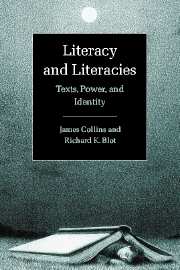Book contents
- Frontmatter
- Contents
- List of figures
- Foreword by Brian V. Street
- Preface
- Acknowledgments
- 1 Introduction: texts, power, and identity
- 2 The literacy thesis: vexed questions of rationality, development, and self
- 3 Situated approaches to the literacy debate
- 4 Literacies and power in modern nation states: Euro-American lessons
- 5 Literacies and identity formation: American cases
- 6 Literacy, power, and identity: colonial legacies and indigenous transformations
- 7 Conclusion: literacy lessons – beginnings, ends, and implications
- Notes
- References
- Index
- Studies in the Social and Cultural Foundations of Language
- References
Foreword by Brian V. Street
Published online by Cambridge University Press: 22 September 2009
- Frontmatter
- Contents
- List of figures
- Foreword by Brian V. Street
- Preface
- Acknowledgments
- 1 Introduction: texts, power, and identity
- 2 The literacy thesis: vexed questions of rationality, development, and self
- 3 Situated approaches to the literacy debate
- 4 Literacies and power in modern nation states: Euro-American lessons
- 5 Literacies and identity formation: American cases
- 6 Literacy, power, and identity: colonial legacies and indigenous transformations
- 7 Conclusion: literacy lessons – beginnings, ends, and implications
- Notes
- References
- Index
- Studies in the Social and Cultural Foundations of Language
- References
Summary
The title of this path-breaking book is a good clue to its intentions. The first term signals a focus on the importance of literacy in contemporary society: “a key word in our culture [that] has a status in the current era rather like that of ‘science’ in the nineteenth” (p. 3). The plural “literacies” signals the authors' attention to a key shift in academic approaches to the field, a shift of focus from a single thing called literacy, seen as a set of “autonomous” skills with far-reaching almost determinist consequences, to a recognition that there are multiple literacies; unravelling what practices might be validly and helpfully termed literacies, what should be included, where the boundaries should be drawn, and what it means to develop a theory of multiple literacies is a major focus of the book. The shift to plural approaches in the 1980s came to be called the “New Literacy Studies” (NLS) (Gee, 1991; Street, 1993; Collins, 1995) and since its path-breaking challenge to the dominance of the autonomous model, scholars in this field have provided a rich array of carefully documented accounts of how literacy practices vary from one cultural and historical context to another. Introducing the concepts of literacy events (Heath, 1983) and literacy practices (Street, 1984; 2000; Barton and Hamilton, 1998), NLS provided a lens, a methodology, and a literature based on them that enabled us to “see” behind the surface appearance of reading and writing to the underlying social and cultural meanings.
- Type
- Chapter
- Information
- Literacy and LiteraciesTexts, Power, and Identity, pp. xi - xviPublisher: Cambridge University PressPrint publication year: 2003
References
- 5
- Cited by



